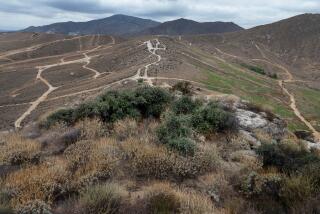Hon Halts $275-Million Bid for Landmark Tract : Real estate: The Laguna Hills developer says it would be ‘too risky’ in the present market climate to buy 9,700-acre Oak Valley.
- Share via
LAGUNA HILLS — Orange County developer Barry G. Hon said Wednesday that he has ended his $275-million bid to buy a Riverside County parcel from Landmark Land Co., whose prize golf courses, resorts and residential acreage he also once coveted.
Hon, who just two months ago agreed to buy most of Landmark’s real estate holdings for $967 million, said it would be “too risky” to buy a 6,700-acre parcel called Oak Valley from Landmark’s thrift subsidiary, Oak Tree Savings Bank in New Orleans.
The “current real estate recssion,” he said, made the price too steep.
Hon’s decision leaves Oak Tree without its anticipated gains from the sale, which it needs to bolster its capital, which is its final reserve against losses.
By Monday, the thrift will fail three federal criteria for adequacy of capital, said Gerald H. Barton, Landmark’s chairman, president and chief executive.
Oak Tree, however, would still be solvent, he said.
Barton said he met Tuesday with the New York investment bank Salomon Bros. to develop a new strategy to sell Oak Tree’s three real estate divisions. That strategy will be part of a capital plan he must submit for approval by federal regulators.
He said he expects Salomon Bros. to have buyers ready to strike a new deal within three weeks.
Landmark is one of the most widely recognized names in golf course developments; the company’s properties include such gems as PGA West, La Quinta and the Mission Hills Country Club, all in the Palm Desert area.
The company holds more than $1 billion in real estate through Oak Tree, but federal law enacted in August to bail out the thrift industry’s deposit insurance system requires S&Ls; to sell their interests in such investments by the end of 1994.
Though both Hon and Barton left open the possibility that they might work out a deal later, neither side is seeking to negotiate one now.
Costa Mesa lawyer Bruce A. Tester, a Hon adviser, said the developer of planned communities relies on builders to buy chunks of property from him once he readies them for development.
But builders are having difficulty arranging loans to make the purchases, slowing down the entire home-building market, he said.
“If you’re a master developer and you’re manufacturing lots, you need to make sure there are builders there to absorb them,” Tester said. “If you alter your projections by stretching out rate of absorption, that makes a tremendous impact on the cost.
“Barry thought the absorption rate was going to be slower than he originally thought because the money is not there for builders to buy lots.”
In mid-April, Hon’s company, based in Laguna Hills, agreed to buy Landmark’s golf course and resort properties in three states, plus more than 10,000 acres of developable land. But the two-phase transaction required Oak Tree to provide roughly 75% of the financing, which regulators decided was too much, so they blocked the deal.
Last month, Hon and Landmark revised the agreement to limit the sale simply to the Oak Valley property. Hon would put $75 million down by the end of July--and Oak Tree would finance the rest--for a planned golf-course community at the Pomona and Redlands (Interstate 10) freeways near Beaumont.
That even the second deal fell through does not surprise short-sellers in Landmark’s stock, who stood to reap profits if Landmark’s stock plunged. They called the deals nothing more than a bid by Landmark to establish a value for the property to satisfy the concerns of regulators.
But Tester said that such a view is nonsense and that the deal had been negotiated at arm’s length and in good faith.
Hon and his financial partners could have completed the deal, he said, but the slowing real estate economy and the credit crunch hurting builders made the price too high.
More to Read
Inside the business of entertainment
The Wide Shot brings you news, analysis and insights on everything from streaming wars to production — and what it all means for the future.
You may occasionally receive promotional content from the Los Angeles Times.









